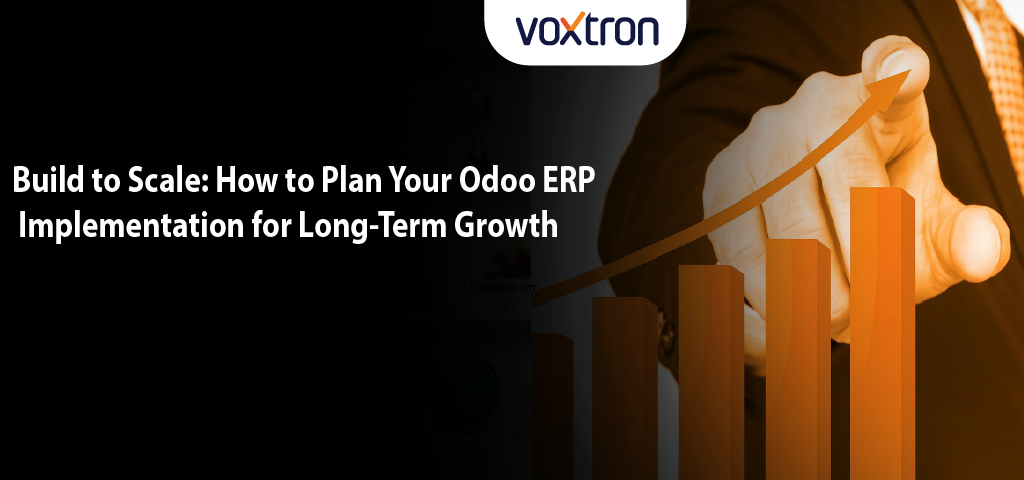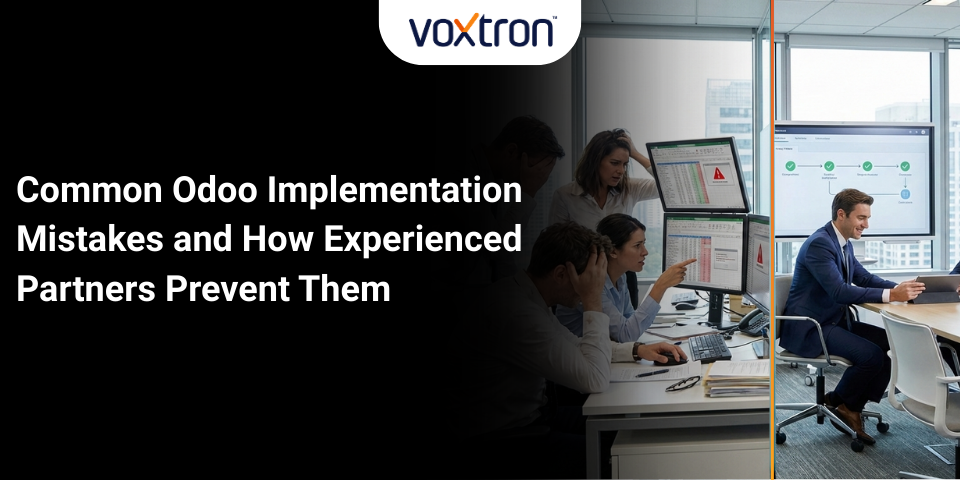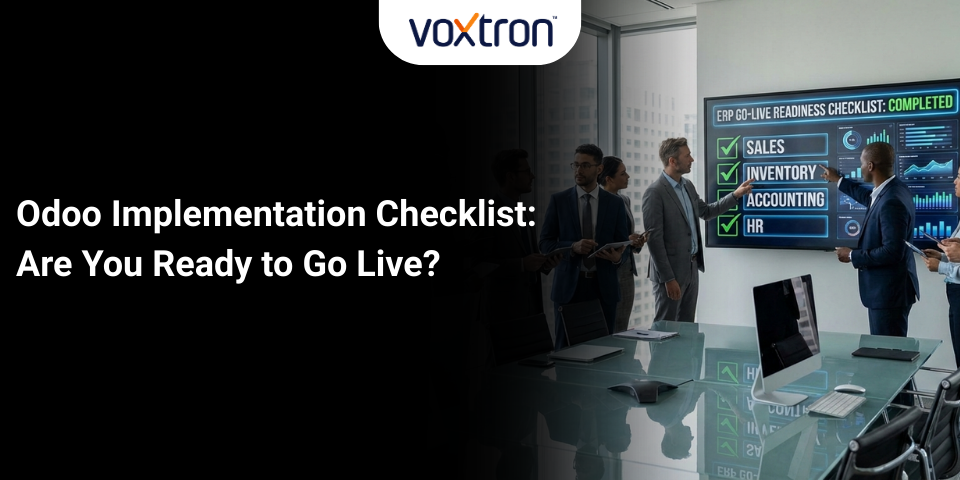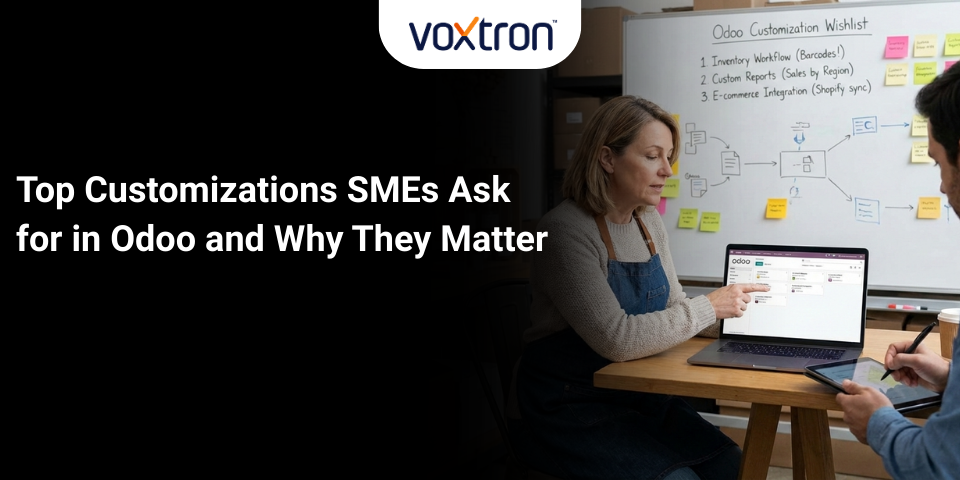
Why Knowledge AI Chatbots Are the Future of Customer Support
August 6, 2025
What Should Buyers Look for in the New CCaaS Market?
August 18, 2025Build to Scale: How to Plan Your Odoo ERP Implementation for Long-Term Growth
For fast-growing SMEs, an efficient ERP helps to unify business, streamline operations, and enable growth. However, as your customer base, product lines, and workforce expand, the real test is whether your ERP can scale across departments and in unexpected directions. Let us explore why scalability must be a priority when you plan your ERP implementation. Additionally, we will also look at how to plan your Odoo ERP implementation for sustainable, cross-departmental growth in this article.
The Scalability Imperative for Modern SMEs
For every business, growth is rarely linear. The current challenge may be to manage a surge in sales. Meanwhile, tomorrow, you may be onboarding new teams or launching new services.
Unfortunately, many SMEs discover too late that their ERP can’t adapt to these evolving demands. This leads to operational slowdowns, data silos, and costly rework.
However, the right ERP grows with your business. In addition, it also clears the path for what comes next.
Odoo ERP is built with that kind of scalability in mind.
Challenges of Scaling in Unexpected Directions
Many businesses face unexpected hurdles if their ERP wasn’t designed to adapt to evolving demands. Hence, understanding the following challenges early on is crucial to avoid operational disruptions and costly fixes down the line.
Performance Bottlenecks: As data and user counts rise, poorly scalable ERPs can slow down, causing delays and frustration.
Integration Issues: New business units or tools (like e-commerce, support, or advanced analytics) can be hard to connect. Over time, these can lead to fragmented data and inefficiency.
Customization Constraints: Rigid systems make it tough to adapt workflows or add features, forcing expensive workarounds.
Cost Overruns: Unplanned scaling can often lead to surprise infrastructure or consulting costs.
Data Management Problems: Growing data volumes can lead to inconsistency, duplication, and reporting headaches.
Change Management: Employees may resist or struggle with new processes if the ERP isn’t intuitive or adaptable.
Why Scalability Planning Must Start Before Implementation
Anticipating growth, especially in new or unexpected directions, lets you build flexibility into your ERP from the outset.
Early planning:
- Reduces the risk of costly rework or disruptive migrations.
- Ensures your ERP remains a growth enabler, not a bottleneck.
- Positions your business to seize new opportunities with agility.
How Odoo Enables Scalable, Cross-Departmental Growth
Odoo’s architecture is designed from the ground up for flexibility and scale. It stands out from both legacy and many modern ERP competitors in the following ways:
1. Modular App Store
Odoo’s app-based design allows you to implement only what you need today. Thus, you can use Odoo to expand at your own pace.
- With 40+ core apps and 30,000+ community-developed modules, you can later plug in HR, Manufacturing, Marketing, or eCommerce without re-platforming.
- This means you can grow organically, adding new capabilities as each department matures.
2. Easy Low-Code Customizations with Odoo Studio
Every department has its own needs, and waiting for developers to adapt the ERP for small needs slows growth. Fortunately, Odoo helps to overcome this.
- Odoo Studio empowers non-technical users to build or modify forms, workflows, and reports using drag-and-drop tools.
- This means teams can quickly adapt the system to reflect new processes, regulations, or roles without the delays of traditional ERP customization cycles.
3. Odoo.sh for Seamless Cloud Scaling
As your operations expand, performance and availability become critical.
- Odoo.sh, Odoo’s managed cloud platform, lets you scale users, storage, and performance on demand—no infrastructure headaches.
- It also supports automated backups, continuous deployment, and integrations with third-party cloud tools. This makes it ideal for businesses that need to scale fast without IT bottlenecks.
4. Flexible Licensing: Community vs. Enterprise
Odoo offers a unique path to scale with its dual-edition model:
- The Community Edition is ideal for startups or tech-savvy teams focused on cost efficiency.
- The Enterprise Edition enables cross-departmental growth and global teams.
- You can start with Community and upgrade to Enterprise as your operations evolve, avoiding expensive re-implementations.
5. Robust Integration Capabilities
Scalability also means your ERP must play well with other systems.
- Odoo offers open APIs and built-in connectors for platforms like Shopify, Amazon, PayPal, and major shipping, HR, and communication tools.
- This ensures departments don’t operate in silos. Thus, everyone can work off the same real-time data.
Cross-Departmental Scaling: Planning for Growth in Waves
An efficient ERP implementation isn’t just about choosing the right platform. It is also about rolling it out the right way. Instead of a “big bang” approach, it is better to plan your Odoo implementation in waves:
- Start with core areas where ROI is immediate.
- Layer in additional departments, such as HR, CRM, Marketing, or Manufacturing, as workflows mature and teams are ready.
- This phased approach ensures each department is fully onboarded and processes are optimized before expanding further, reducing risk and maximizing adoption.
Actionable Steps for Future-Proofing Your Odoo ERP
- Conduct a detailed needs and gap analysis with scalability in mind.
- Map out potential growth scenarios from new product lines to international expansion. Then stress-test your ERP plan.
- Build feedback loops with users for continuous system improvement.
- Invest in ongoing training and change management to ensure high adoption as new modules roll out.
- Partner with an experienced Odoo solutions provider who understands both the technical and organizational aspects of scaling for efficient deployment.
Key Takeaways for Decision Makers
Building your ERP for growth enables your business to adapt, innovate, and thrive in any direction growth takes you. Scalability is a strategic imperative in this regard.
Odoo’s unique blend of modularity, customization, and cloud power makes it the ERP of choice for ambitious SMEs. Plan your implementation with scalability at the core, and you’ll future-proof your business for whatever comes next.
A phased ERP rollout allows each team or department to be onboarded without disruption. This ensures steady adoption and optimized workflows at every stage.
At Voxtron, we’ve helped growing businesses like yours map out smart, scalable Odoo implementations that work across teams and adapt as they grow.
If you are ready to build an ERP that grows with you, contact us to find out how we can make it happen.




